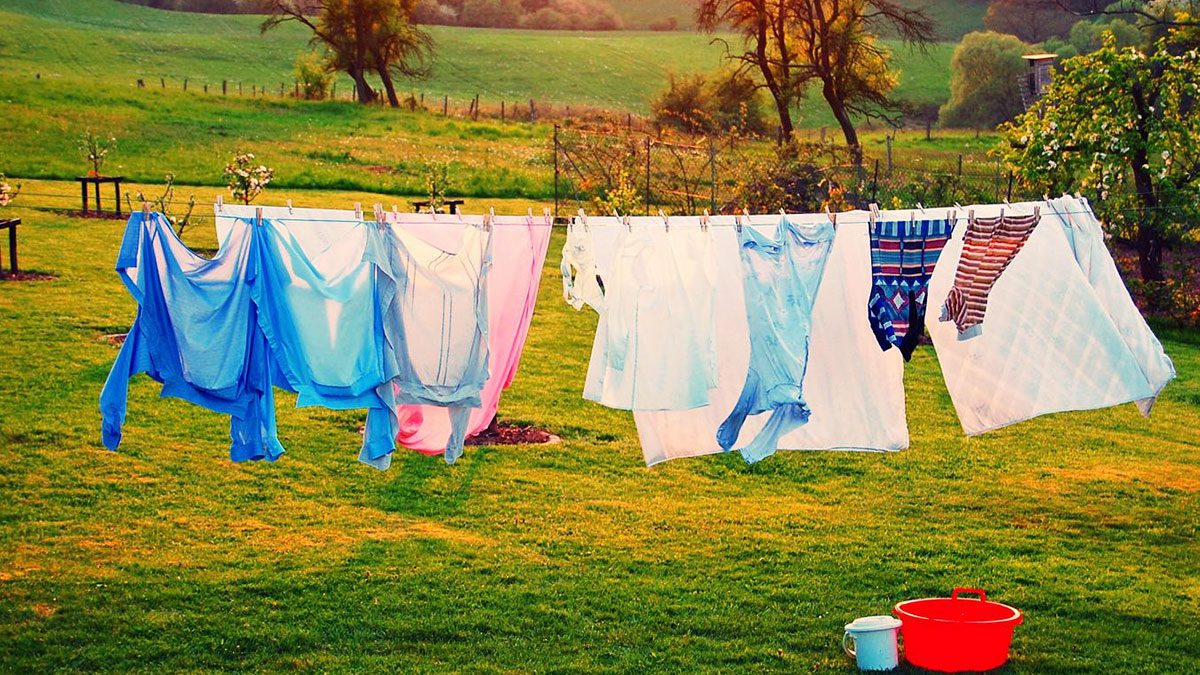My family take pride in hanging out our washing to dry in the sun and wind – a small contribution to the fight against global heating. But we can’t help noticing that our neighbors haven’t followed our lead. Clotheslines are a rare sight.
Recently I raised the matter on Facebook and Quora (a website where people answer one another’s questions). Why do so few people in the US hang out their laundry to dry?
One thing I learned is that it was not always so. ‘Back in the 1950s, 1960s, and 1970s many Americans did air dry our clothes outside. But this is no longer practical for most people.’
Why not? Because people work longer hours than they used to. They just don’t have the time to hang out clothes or cook or wash up dishes or wait for buses. Naturally they rely more on fast food, takeout meals, cars, and appliances.
But hold on. Isn’t this a circular argument? You work long hours so as to afford appliances, cars, takeout meals, and fast food. You rely on these things because you don’t have time to cook, hang out washing, or go by bus. And you don’t have the time because you work long hours.
Use of a drier, I was told, is much more convenient. You dump in the washing, turn the machine on, and get on with other chores. If you hang it out, you have to think about how and where to hang each item. You have to keep an eye on the weather and look out for bugs, bird droppings, and clothes thieves.
Nevertheless, a few respondents did hang out their laundry – and even enjoy it.
Several people informed me that ‘in many places hanging out washing is illegal.’ This astonished me and drove me to investigate further. Could anyone name a city where it is illegal? Yes, one respondent had heard from his sister that it is illegal in Plymouth, Minnesota. I sent a query to the city government and received the following reply from a senior planner:
Plymouth ordinance allows clothes lines for drying of laundry within side and rear yard areas, provided they are set back a minimum of six feet from lot lines. It’s possible that some neighborhood homeowners’ associations may preclude them, but these are private covenants that the city is not a party to. The city has no ability or desire to enforce private covenants.
Evidently my respondent’s sister had mistaken rules of homeowners’ associations (HOAs) for municipal law.
According to eyeonhousing.org, an HOA is ‘an organization in a subdivision, planned community, or condominium building that makes and enforces rules for the properties and their residents.’ Since 1964 HOAs have grown rapidly. In 2020 there were 355,000 of them, covering 74 million residents or 26% of the population. However, the proportion of newsingle-family houses that are tied to HOAs is much higher – 61% in 2017 (with wide regional variation).
It is common for HOAs and managers of rental property to prohibit homeowners and renters from hanging laundry out to dry. In response, campaigners for the ‘right to dry’ have persuaded legislators in 19 states (as of 2013) to pass laws prohibiting such clothesline bans. The provisions of these laws vary from state to state, creating a complicated legal situation.
What are the reasons given by opponents of the right to dry? [1]
Well, they say that drying laundry is ‘unsightly’ and obstructs the view. They want to ‘preserve the esthetics’ of their ‘picturesque scene’ (which may also mean that everyone must paint their house in the same color). In particular, they do not want to see their neighbors’ underwear.
They say they worry about safety, especially the risk of strangulation. In fact, collapsible rotary clotheslines do present a hazard to young children, but not clotheslines of the old-fashioned kind. [2]
And they say that they want to preserve property values. The same reason is always given for keeping black and poor people out of well-to-do white suburbs and for vetoing all plans to locate public housing projects there, as well as institutions for the disadvantaged such as homeless shelters and group homes for the developmentally disabled.
The basic problem is that hanging washing out to dry has become a mark of poverty. People concerned to maintain or improve their relative social status – and that, unfortunately, means most people — will avoid anything that might convey the impression that they are poor. The same is true of other environmentally desirable behaviors, such as traveling by bus instead of private car.
And this goes to show yet again why environmental problems cannot be tackled effectively without also dismantling the class structure of society.
Notes
[1] This section draws on: Virginia Groark, ABA Journal, 1/2/10; Martha Neil, ABA Journal, 8/14/13; and Quora responses.
[2] ‘Collapsible washing lines: a strangulation hazard,’ British Medical Journal, vol. 282, May 23, 1981.



